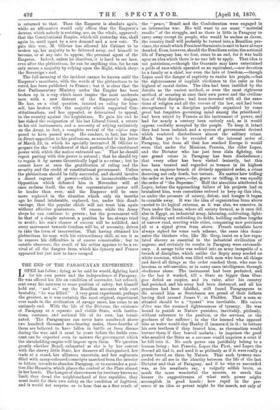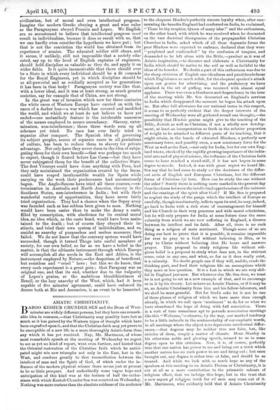THE END OF THE PARAGUAYAN EXPERIMENT.
LOPEZ has fallen ; dying, as he said he would, fighting hard for his own power and the independence of Paraguay. He was offered his life on condition of surrender, but refused, sent away his mistress to some position of safety, but himself held out, " and so," say the Brazilian accounts with curt brutality, " he was killed." A very great experiment, perhaps the greatest, as it was certainly the most original, experiment ever made in the civilization of savage races, has come to an untimely end. With the life of the Dictator, the existence of Paraguay as a separate and visible State, with institu- tions, customs, and national life of its own, has termi- nated. The Paraguayans can never have numbered above two hundred thousand arm-bearing males, three-fourths of them are believed to have fallen in battle or from disease during the war, and it must be years before the feeble rem- nant can be expected even to menace the government which the slaveholding empire will impose upon them. We question greatly whether Brazil, exhausted as she is by her contest with the sinewy little State, her finances all disorganized, her trade at a stand, her alliances uncertain, and her regiments filled with many-coloured conscripts marched from the interior in fetters, intends to abandon Paraguay, or to surrender a posi- tion like Humaita, which places the control of the Plate almost in her hands. The hunger of slaveowners for territory knows no limit, they dread the neighbourhood of free republics, they must insist for their own safety on the rendition of fugitives, and it would not surprise us to hear that as a first result of the " peace," Brazil and the Confederation were engaged in I an internecine war. Rio will want to see some "material results " of the struggle, and as there is little in Paraguay to carry away except its people, who would be useless as slaves, the country itself will probably be turned into a Brazilian pro- vince, the result which President Sarmiento is said to have always dreaded. Even, however, should the Brazilians retire, the national life of Paraguay has, we fear, come to an end, for it was built upon an idea which there is no one left to apply. That idea is not patriotism,—though the Guaranis may have entertained a pride of race which operated as an equivalent, —nor devotion to a family or a chief, nor even the love of freedom,—though Lopez used the danger of captivity to excite his people,—but the righteousness of implicit obedience to the ruler as the highest of moral duties. The idea had been instilled by the Jesuits as the easiest method, or even the most righteous method, of securing at once their own power and the civiliza- tion of their disciples; had been invested with all the sanc- tions of religion and all the terrors of the law, and had been strengthened by a discipline probably organized by some great but forgotten governing mind among the priesthood ; had been seized by Francia as his instrument of power, and had for nearly a century been entirely and, as it would appear, cordially accepted by the people. To keep it intact they had been isolated, and a system of government devised which rendered disobedience almost the solitary crime. Much has yet to be revealed of the internal order of . Paraguay, but from all that has reached Europe it would seem that under the Missions, Francia, the elder Lopez, and the Dictator who has just been slain fighting, the one grand crime in Paraguay has been disobedience ; that every other has been visited leniently, but this has been treated and regarded as treason in its highest sense, an impious breach of divinely appointed order, a crime deserving not only death, but torture. No matter how trifling the order or how grave,—for, grave or trifling, it was equally the order of "the Supreme." Half the atrocities attributed to Lopez, before the approaching failure of his projects had so brutalized him, were executions ordered to keep up this idea, as under the pressure of misery, defeat, and hunger it began to crumble away. It was the idea of organization from above carried to its logical extreme, as it was also, we conceive, in Peru under the Incas, where all society formed, as it once did also in Egypt, an industrial army, labouring, cultivating, fight- ing, dividing and redividing its fields, building endless lengths of narrow road, erecting wide cities, conquering new provinces all at a signal given from above. French socialists have always sighed for some such scheme, the same idea domi- nates the thinkers who, like Mr. Greg, insist on a law-regu- lated slavery as essential to the industrial civilization of negroes, and certainly its results in Paraguay were extraordi- nary. A savage tribe was welded into an army incapable of a breach of. discipline, which unlike the Sepoy army needed no white coercion, which was filled with men who bore all things and dared all things as the order reached them, who rose to heroism or self-sacrifice, or in many cases intelligence, through obedience alone. The instrument had been perfected, and to the last it worked, till a State no bigger than Glas- gow defied an empire, and its ruler, after his country had perished, and his army had been destroyed, and all his promises had been falsified, still found Paraguayans to die around him as Scotchmen are proud of their fathers having died around James V. at Flodden. That a man so situated should be a " tyrant" was inevitable. His raison d'etre was the assumed righteousness of tyranny. He was bound to punish as Nature punishes, inevitably, pitilessly, without reference to the position, or the services, or the goodness of the sufferer ; to slay the learned who opposed him as water would slay Huxley if immersed in it ; to torture his own brethren if they braved him, as rheumatism would torture them if they braved malaria ; to imprison the good who assailed the State as a crevasse would imprison a saint if he fell into it. No such power can justifiably belong to a human being ; but Francia, Lopez the First, and Lopez the Second all had it, and used it as pitilessly as if it were really a power forced on them by Nature. That such tyranny suc- ceeded we all see in the identity between the life of the last Dictator and that of Paraguay, and if he who so succeeded was, as his assailants say, a vulgarly selfish brute, so much the more wonderful the success, so much the keener its suggestiveness of what such power might accomplish in good hands ; how rapid in the pre- sence of an idea so potent might be the march, not only of civilization, but of moral and even intellectual progress. Imagine the modern Greeks obeying a great and wise ruler as the Paraguayans obeyed Francia and Lopez. We English are so accustomed to believe that intellectual progress must result in individualism, because it does so result with us, that we can hardly even consider the hypothesis we have put ; but that is not the conviction the world has obtained from its experience of armies. The educated soldier still obeys, and it seems, if unlikely, still not impossible that a society edu- cated, say up to the level of English captains of engineers, should hold discipline as valuable as they do, and apply it on wider fields. Is it quite inconceivable that there should ever be a State in which every individual should be a fit comrade for the Royal Engineers, yet in which discipline should be as all-powerful and as cordially accepted as for generations it has been in that body ? Paraguayan society was like that, with a lower ideal, and it was at least strong, as much greater societies, say for example that of China, are not strong.
In the great war of invasion which now for three centuries the white races of Western Europe have carried on with the races of a darker hue—a war which has covered and modified the world, and which we at least do not believe to have yet ended—one melanCholy feature is the intolerable sameness of the means employed to secure ascendancy. Slavery, exter- mination, non-interference ; those three words sum up all schemes yet tried. No race has ever fairly tried to organize after conquest. The Spanish idea of governing its subject peoples, scores of separate races in all gradations of culture, has been to reduce them to slavery for private advantage. Not only have they never risen to the idea of subju- gating them for their own benefit—that was perhaps too much to expect, though it floated before Las Casas—but they have never subjugated them for the benefit of the collective State. The first Viceroys could have done anything with Peru, had they only maintained the organization created by the Incas, could have reaped inexhaustible wealth for Spain while carrying on the work their predecessors had unconsciously begun. The Anglo-Saxons have tried all three courses,—ex- termination in Australia and North America, slavery in the Southern States, non-interference in India ; but with their wonderful variety of opportunities, they have never fairly tried organization. They had a chance when the Sepoy army was founded such as has seldom been given to man. Nothing would have been easier than to make the Army a caste, filled by conscription, with obedience for its central moral idea, an idea which, as the caste bond, would have been main- tained to the death ; but of course they obeyed their in- stincts, and tried their own system of individualism, and so, amidst an anarchy of purposeless and useless massacre, they failed. We do not know that the contrary system would have succeeded, though it turned Thugs into useful members of society, for our own belief, so far as we have a belief in the matter, is that the ultimate instrument through which Europe will accomplish all she needs in the East and Africa, is the instrument employed by Nature,—the despotism of beneficent, but resistless and "cruel " laws ; but this we do know, that every such experiment is a great gain ; that Paraguay was an original one, and that its end, whether due to the vulgarity of Lopez's genius, or the ambitious bloodthirstiness of Brazil, or the lazy anarchy of the West, which, had it been capable of five minutes' agreement, could have enforced its decree both at Rio and Assuncion, is an event to be lamented.































 Previous page
Previous page